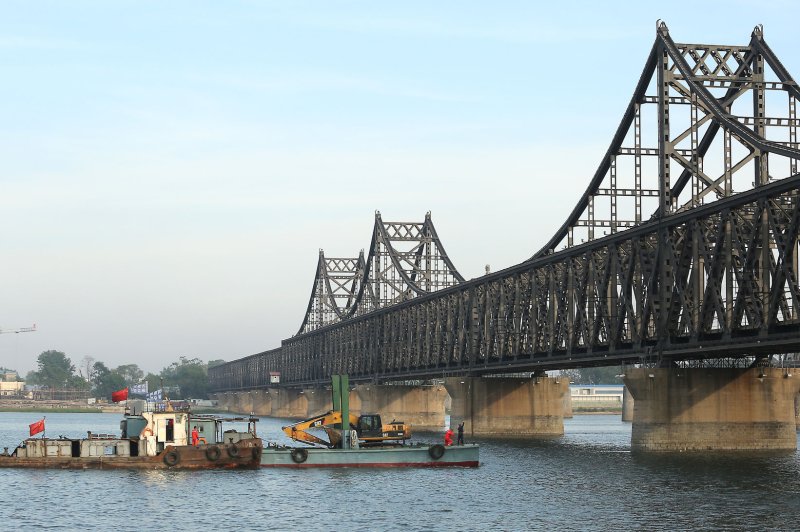A Chinese barge transports a CAT backhoe down the Yalu River past the North Korean city Sinuiju (background), across the Yalu River from Dandong, China's largest border city with North Korea. A new study from the Center for Strategic and International Studies suggests cross-border activity dropped after North Korea’s fourth nuclear test and before the adoption of U.N. sanctions in March. File Photo by Stephen Shaver/UPI |
License Photo
WASHINGTON, June 30 (UPI) -- Fewer trucks, trains and boats are moving between China and North Korea since Pyongyang's fourth nuclear test, and the reduction in activity took place well ahead of the United Nations Security Council sanctions resolution, according to a recent analysis of satellite imagery.
According to the study from the Center for Strategic and International Studies' Beyond Parallel initiative on Korean unification, activity has decreased significantly between early 2015 and February 2016.
Satellite images used in the study looked at key transportation areas in the Chinese border city of Dandong and the North Korean city of Sinuiju.
The Dandong customs area showed a major decrease in activity after Pyongyang's January nuclear test. While several trucks were seen in January and March 2015, only six trucks were captured in the image taken in February.
There are other signs transportation flows have dropped.
A rail station on the North Korean side showed dozens of rail cars in 2015, but in 2016 any rail cars present appeared to have no engines – indicating the trains were being stored on the tracks, according to the report.
The study supports recent statements from Chinese and other officials that indicate Beijing is moving in unprecedented ways to enforce both unilateral and U.N. sanctions against North Korea.
Chinese foreign ministry spokesman Hong Lei had said this week China has "consistently and with integrity carried out its international obligations and has been implementing the resolutions." Beijing also submitted an implementation report to the U.N.'s North Korea sanctions committee in a more timely manner than in 2013.
The most recent trade data from Seoul's Korea International Trade Association also shows that Chinese trade with Pyongyang declined year on year in May.
China imported about $176 million of goods from North Korea last month, a decline of 12.6 percent from May 2015.















